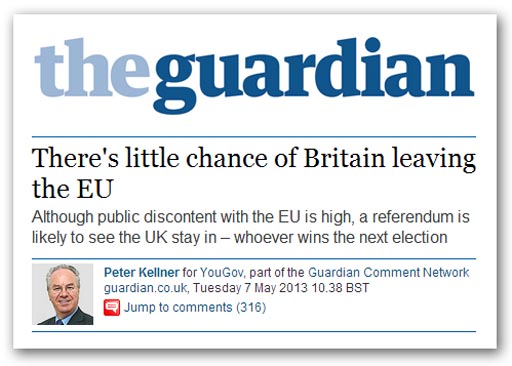To that effect, the paper enlists Peter Kellner, of YouGov – husband of eurocrat Baroness Ashton. He quite rightly ignores any question of a referendum earlier than the general election, and posits whether we will still be a member of the European Union in 2020.
In the first of three scenarios, Kellner rehearses the outcome of David Cameron redeeming his promise to renegotiate Britain's membership terms and holding a referendum in 2017. As of 21 and 22 April, a YouGov poll had voters who want to leave the EU comfortably outnumbering those who wanted to stay in, by a margin of 43 to 35 percent.
But, he says, whenever Cameron has made the EU a high-profile issue, the gap tends to close. In one poll in mid-January YouGov found more people wishing to stay in the EU than leave it.
Then, YouGov asks respondents to imagine that Cameron has renegotiated our relationship with the EU and said that Britain's interests were now protected, thus recommending that Britain remain a member of the EU on the new terms.
Asked how they would then vote in a referendum, every time the question is put, those saying "stay in" clearly outnumber those who say "get out". The most recent poll finds a three-to-two majority for remaining in the EU. And in a real referendum, Kellner expects a similar rest.
In a Conservative-inspired referendum in 2017, the leaders of all three main parties would advocate a vote for remaining in the EU. They, and much of the business community, would issue dire warnings of how bleak life would be on the outside; only a minority will share Lawson's view that prosperity would be greater if we withdrew.
The unspoken "mood" question, says Kellner, would shift from today's "Do you like the EU?" (majority answer: no), to "Is it better for British jobs and prosperity for the UK to remain in the club than risk the hazards of life on the outside?" (probable majority answer in 2017, as it was in 1975: yes).
Thus does he conclude that, as in so many referendums round the world, when there is no settled national consensus, the status quo will prevail.
The second of the scenarios is where Labour wins the 2015 election and Ed Miliband sticks to his current position of opposing a referendum. There, the consequences are simple. Britain would remain in the EU, at least until after the 2020 general election. In the third scenario, though, Miliband wins the general election having changed his stance and promising a referendum. Cameron resigns and is replaced by a strongly eurosceptic successor.
In these circumstances, says Kellner, a referendum fought in 2017 could have a Labour government suffering mid-terms blues up against the main opposition party advocating withdrawal. Then, the possibility of the UK voting to leave the EU would be very real.
Alternatively, a Miliband victorious at the general election could call a snap referendum which, in the honeymoon phase of his administration, he could well win.
Thus does Kellner conclude that, if the parties stick to their current plans, he sees little chance of Britain leaving the EU. The best chance is of Miliband matching Cameron's promise of a mid-term referendum in 2017.
Then, he says, a striking paradox emerges. In those circumstances, anyone whose overriding passion is for Britain to stay in the EU should vote Conservative – while anyone desperate to maximise the chances of quitting should vote Labour – provided Labour has committed to a mid-term referendum.
If this is the Kellner view though, under current conditions there is another possibility – that a vote for UKIP at the general ends with a weak Lab-Dem coalition, and an alignment between the Conservatives and UKIP as the official opposition. And that alliance could be strong enough, politically, to force the government into giving us a referendum.
But, while events beyond anything but a straight Conservative victory at the general is hard to read, what is very clear already is the europhiles intend to fight a referendum on the FUD (fear-uncertainty-doubt) factor, with the greatest stress on potential loss of jobs.
And there, despite Kellner's certainty, a referendum is winnable, if we can neutralise the FUD. If we can show how leaving the EU will not impact adversely on jobs, and can deal with the other factors which the europhiles claim as their own, and can then spread the message effectively, we can beat the status quo effect.
However, that means we cannot leave the battle until the start of an official referendum campaign. We need to have a plan agreed and ready as soon as possible, and should be actively fighting the campaign even before the general election. With some years to go, we have time, but only if we do not waste any more of it.
Thus, Kellner's analyses are not to be trusted. We know where his true loyalties lie, and they are not with us. And Kellner says we can't win with a Conservative government in place, and – effectively – won't even have a referendum with Labour in place.
I say we can win a referendum under the Tories, and can force one under Labour (which we can also win) - but only if we start now, developing and following a coherent plan. And that is, preferably, with UKIP. But, if necessary, we will have to do without.
COMMENT: COMBINED REFERENDUM THREAD
